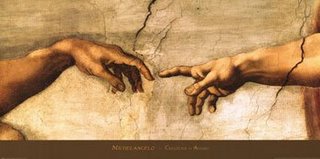
By Jennifer Harper
THE WASHINGTON TIMES
Published November 12, 2006
The vast majority of Americans believe in God. But in the land of the free, ideas about the more personal nature of God can be subject to some interpretation. (In this survey traditional Protestants have been distinguished from Evangelical "Born-Again" Christians).
Only 1 percent of Americans overall, for example, think God is female, according to a wide-ranging Harris poll of 2,010 adults. Among men, Protestant and Born-Again Christian respondents, the number was 0 percent; among women and Catholics it was 1 percent; among Jews, 7 percent.
More than a third -- 36 percent -- said God was male. More women than men thought God was male, 39 percent to 34 percent, respectively (interesting that more American women than men consider Biblical language such as "Father" accurate). More than half of Born-Again Christians agreed, along with about 47 percent of the Protestants and Catholics. Other responses were mixed. Overall, 37 percent said God was neither male nor female. Ten percent said God was both male and female, while 17 percent were not entirely sure what they believed.
Does God look like Michelangelo's vision on the ceiling of the Sistine Chapel? Maybe. The survey showed that 9 percent said God appeared "like a human with a face, body, arms, legs, eyes," though the percentage was slightly higher -- 13 percent -- among Protestants, but just 1 percent among Jews.
More people -- 41 percent-- were comfortable with the idea that God is a "spirit or power that can take on human form, but is not inherently human." The sentiment was highest among Born-Again Christians, with 60 percent agreeing with the statement (What happened to the doctrine - Fully God and Fully Man?). More than a quarter of Americans overall say God is "a spirit or power that does not take human form," a belief shared by 49 percent of Jewish respondents.
Beliefs about God's involvement in events on Earth also varies. Twenty-seven percent of Catholics said God "controls what happens on Earth," compared with 41 percent among Protestants and 57 percent among Born-Agains. Forty-four percent said God "observes but does not control" what happens here. That figure rises to 58 percent among Catholics, but falls to 37 percent among Born-Agains.
A slim majority of Americans -- 51 percent -- believe Christians, Jews and Muslims "worship the same God," the poll found. That idea is shared by 63 percent of Catholics, about 48 percent of Protestants and Jews and 34 percent of Born-Agains. Almost a third overall said the three faiths do not worship the same God, and 16 percent were unsure. (Jesus said about Himself, "I am the Way, the Truth and the Life. No man comes to the Father except through me." John 14:6)
Intensity of belief also varies among faiths and political parties. Overall, 73 percent of Americans believe in God; the numbers are 97 percent among Born-Agains, 90 percent among Protestants, 84 percent among Catholics, 64 percent among Jews, 83 percent among Republicans and 72 percent among Democrats.
Are Americans "absolutely certain" there is a God? Born-Agains are the most adamant, with 93 percent agreeing with the statement (and how did that 7% become "born-again" and not believe in God???), followed by 76 percent of Protestants, 64 percent of Catholics and 30 percent of Jews. Overall, 6 percent are "absolutely certain" there is no God.
Almost half of Americans overall -- 46 percent -- attend church a few times a year, 35 percent go once a month and a quarter go every week or more often.
The survey was conducted Oct. 4-10 and has a margin of error of two percentage points.
Creation of Adam (Detail) Michelangelo - Art.com




.jpg)
2 comments:
"More people -- 41 percent-- were comfortable with the idea that God is a "spirit or power that can take on human form, but is not inherently human." The sentiment was highest among Born-Again Christians..." What! Is the incarnation of Christ not necessary, anymore, to be "born-again?"
Side note: are not "traditional protestants," and the rest of the Church born-again as well? Not a criticism of the writer, here, just an interesting question. The words we use to distinquish our theological nuances imply some pretty severe things. By the way, what does the word "evangelical" mean?
I am often amazed at the way the definition of words changes over time. For example, to be "gay" in the 1920's may have been cause for a parade, but had nothing to do with one's sexuality.
From Wikipedia (which may not always be accurate, but it does give insight to what people commonly believe about words and their meaning today)--
"The word evangelicalism usually refers to religious practices and traditions which are found in conservative, almost always Protestant Christianity (with the exception of 'Evangelical' Catholics). Evangelicalism is typified by an emphasis on evangelism, a personal experience of conversion, biblically oriented faith and a belief in the relevance of Christian faith to cultural issues. In the late 20th century and early 21st century, Protestant people, churches and social movements have often been called evangelical in contrast to Protestant liberalism.
Note that in continental Europe the word Evangelical is often understood to mean Protestant or even Lutheran as a literal translation of the German 'evangelisch'."
Much like the word "Pentecostal" is used in Ethiopia to refer to all people who consider themselves Christian, but are not Orthodox or Catholic. The word evangelical covers a broad range of Christians.
I think we at CCC are "evangelical" in our emphesis on the Gospel, our dependance upon the Bible for doctrine and life, our emphesis on a personal realtionship with God (in the context of the community of faith) and our evangelical efforts in missions (specifically spreading the Gospel through preaching in addition to good works). We are NOT "evangelical" when it comes to political action or the belief that we are going to effect radical social change through human effort.
So, in a very specific historical sense we are evangelical. Using a modern definition of the word, maybe not.
Post a Comment